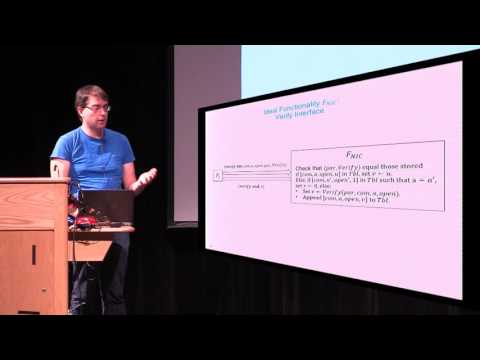Welcome to the resource topic for 2016/581
Title:
UC Commitments for Modular Protocol Design and Applications to Revocation and Attribute Tokens
Authors: Jan Camenisch, Maria Dubovitskaya, Alfredo Rial
Abstract:Complex cryptographic protocols are often designed from simple cryptographic primitives, such as signature schemes, encryption schemes, verifiable random functions, and zero-knowledge proofs, by bridging between them with commitments to some of their inputs and outputs. Unfortunately, the known universally composable (UC) functionalities for commitments and the cryptographic primitives mentioned above do not allow such constructions of higher-level protocols as hybrid protocols. Therefore, protocol designers typically resort to primitives with property-based definitions, often resulting in complex monolithic security proofs that are prone to mistakes and hard to verify. We address this gap by presenting a UC functionality for non-interactive commitments that enables modular constructions of complex protocols within the UC framework. We also show how the new functionality can be used to construct hybrid protocols that combine different UC functionalities and use commitments to ensure that the same inputs are provided to different functionalities. We further provide UC functionalities for attribute tokens and revocation that can be used as building blocks together with our UC commitments. As an example of building a complex system from these new UC building blocks, we provide a construction (a hybrid protocol) of anonymous attribute tokens with revocation. Unlike existing accumulator-based schemes, our scheme allows one to accumulate several revocation lists into a single commitment value and to hide the revocation status of a user from other users and verifiers.
ePrint: https://eprint.iacr.org/2016/581
Talk: https://www.youtube.com/watch?v=38plb2nj6SQ
See all topics related to this paper.
Feel free to post resources that are related to this paper below.
Example resources include: implementations, explanation materials, talks, slides, links to previous discussions on other websites.
For more information, see the rules for Resource Topics .
